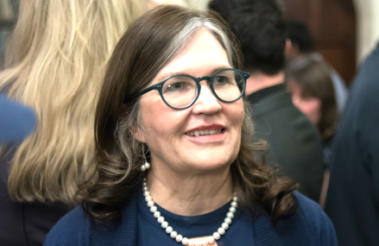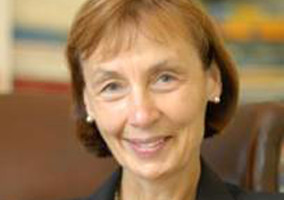Trustees at rights charity The Advocacy Project yesterday voted to begin the process of its chief executive becoming a fully-fledged trustee.
The west London-based charity will now look at changing its governing document to allow Judith Davey to join the trustee board.
The nine trustees put the matter to a vote at the end of a debate about the pros and cons of such a move, which included consideration of an independent report by consultancy Campbell Tickell, and a short presentation to the board by Rosie Chapman, governance consultant and former director of policy and effectiveness at the Charity Commission.
The Advocacy Project began exploring the concept last autumn, after discussion was sparked by its chair Kate Ferguson, a finance director in the private sector and trustee Dr Dele Olajide, a medical director at an NHS foundation trust – both sectors where unitary boards are commonplace.
Short report on pros and cons
After carrying out some desk-based research into unitary boards in the health and corporate sectors, the Advocacy Project commissioned Campbell Tickell to write a short report examining the arguments for and against, outlining the practical considerations, and making recommendations. Davey said the charity wanted to make sure it was making an evidence-based decision so it invited external as well as internal perspectives.
Campbell Tickell said that the governance arrangements already in place at the Advocacy Project “create a resilient platform to resist undue influence by a powerful chief executive on the rest of the board”.
They also said that where they had worked with charities that had moved to a unitary board structure, it is “working well and anticipated problems have not materialised”.
They concluded that “on balance, we favour the inclusion of the chief executive on the board because it emphasises that responsibility for the success or failure of the organisation is shared by executives and non-executive. We have not found that it creates difficulties or conflicts of interest that cannot be managed with the right advice and careful preparation.”
Changing governing document costs money
But at yesterday’s board meeting, Rosie Chapman was not so enthusiastic about the proposal.
“My take is, if you are a good charity you are a good charity and I don’t think it will make any difference if the CEO is a trustee or not.
Chapman warned that making such a change to the charity’s governing document would cost money, and urged the board to consider whether this was money worth spending, and to think about the opportunity cost: “Is it better to spend it on this or on something else that will benefit your beneficiaries?”
However, she added: “I accept that sometimes it can be really important to the CEO that they are a member of the board and if it is vitally important to them then maybe it is worth considering.”
Committed to good governance
Davey explained that the Advocacy Project was an organisation committed to good governance and to continuous improvement, and that as an individual, she wanted the charity to be “the best it can possibly be for its service users”.
“We have brought service users onto the board and we bring that service-user voice to everything we do, so it feels to me to be fundamentally wrong that I have less responsibility in law than our trustees with learning disabilities or mental health issues.”
She said that her feeling as chief executive – and she had heard the same argument from other charity CEOs – was that it is quite disempowering to be doing a lot of the “heavy lifting” but not be part of the strategic decision-making. “You want to be part of that decision-making,” she said.
In response to a question from service-user trustee Vittoria De Meo about how the board would manage the conflicts of interest, Davey said that the charity already had robust processes in place to neutralise or minimise conflicts. For instance, the HR remuneration committee would continue to apply the same criteria for reviewing all salaries, including hers, and she would have no influence on that committee.
Trustee payment?
Michael Hagan, another service-user trustee, asked where the power would lie if Davey joined the board. He was told by the chair that “the board will still sit above Judith and will still hold her to account for delivery of strategy in the same way it does now”.
Hagan then asked about payment. “Service-user trustees have been told they can’t be paid, so isn’t there a conflict if Judith is paid and on the board?”
Davey responded that while she would continue to be paid for her staff role, she would not be paid for her trustee role. However, she added that the Advocacy Project should continue to agitate for its service user trustees to be paid something for their contribution, because both the Department of Health and the Social Care Institute for Excellence guidelines state that beneficiaries should be paid for their engagement.
In the end, the board voted that the charity should start the process of becoming a unitary board, provided that certain tests were met in terms of cost and the time and resource it would swallow.
They also agreed that while they are changing the charity’s constitution, they should look at allowing their service-user trustees to be paid, and at broadening its terms of reference to enable it to offer services that are currently outside its remit, such as recovery cafes.
|
Related articles











